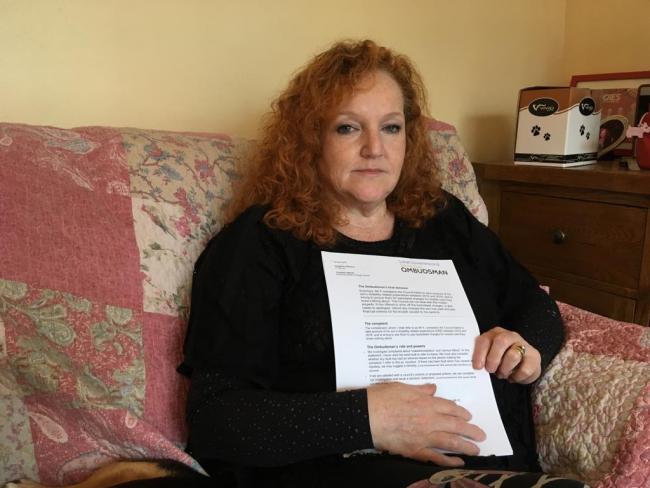A FAMILY have described their horror after a £2,500 care bill for their severely disabled son suddenly arrived in the post that the council had never bothered to tell them about.
Mum Shelagh Thompson said the ordeal that saw the council suddenly issue an invoice of £2,427.42 for her son David’s respite care has been a 'nightmare.'
It was received last year, and following a subsequent complaint by the Wirral family to the local government ombudsman, the council has written off the debt, apologised to the family and paid them a fee for the trouble.
Now Shelagh, whose son David, 24, has 'profound learning disabilities and autism', has told the story of the Birkenhead family’s situation.
She said: “It was quite a shock. When you’re on hardly any money and a carer there’s not a lot of cash going around, so every penny counts.
“As a carer I can’t go to the bank and ask to borrow money as they would just tell me ‘you’ve got no income’.
“I’m terrified now [about the prospect of any more unexpected bills]. It makes you sweat. It makes your heart go. You can’t sleep – it’s terrible. It fills you with anxiety that you don’t need.”
It began in March 2016, when the council wrote to Shelagh to say David’s care costs had increased, and that invoices would be sent after each period of care received.
According to the ombudsman’s report published earlier this year, Shelagh contacted the council to say she could not afford the charges. The authority then sent a form to her to identify her son’s disability related expenditure (DRE), but the family say they never received it.
The charges for respite care then also rose, without, the report said, the council telling the family.
Then, in February 2017, Shelagh said she received an invoice for an eye-watering £2,427.42.
She said it happened as the council was not clear enough when informing about charges.

Shelagh Thompson
She added: “It’s been very, very frustrating as it’s a financial issue over your head. You never know what’s going to happen.
“I was thinking ‘what are we going to do now’, but you can’t squeeze blood out of a stone.
“When we got the bill, everyone was running around trying to work out what was going on – I couldn’t understand it.”
After negotiations between Shelagh and social services, she took the case to the local government ombudsman, who found the council was at fault as it did not invoice for respite care “in a timely fashion”.
The decision notice added: “[The council] waited until he owed £2,427.42, which is not helpful for someone living on benefits. The council has agreed to write off this money, which will remedy the injustice caused to him.
“The council also needs to consider what action to take to ensure it invoices people for care in a timely fashion, to avoid putting them into significant debt.”
It also said the council charges began in March 2017 “without carrying out a proper financial assessment”.
There was also fault found in the way the local authority did not consider David’s DRE, and that charges were only reduced in September last year.
It was also at fault for not realising one aspect of David’s health problems were significant enough to mean there should be no charge for care received for it.
The council said it would repay any contributions paid since March 2016.
As well as those repayments, the council also agreed to send a written apology and pay the family £200 'for the trouble it caused them', as well as 'consider what action to take to ensure it invoices people for care in a timely fashion, to avoid putting them into significant debt.'
According to Shelagh, who gave up her work to care for David when he was four years old, her life is now 'inconsequential.'
She said: “I’m nothing now, it’s all about David. His needs are so profound that they’re all-encompassing, and come before anything I do.
“I have felt very isolated and lonely – I’ve lost countless friends. I’ve got no conservation, all of it is about my son.
“You just get so socially isolated, lose confidence, the ability to formulate reasonable arguments because you’re exhausted.
“You become ill and depressed, I’ve had all that, even if you try to keep smiling and laugh through it.
“I only get a couple of hours sleep if I’m lucky. I’m ill and you’d think they’d recognize you’re doing something to help somebody. If they’d just recognize you need some support, and even if it’s just to say ‘okay here is very clearly the amount you have to pay’.”
Speaking about the ombudsman process, she said she thought it was 'pretty fair.'
She said: “They were easy to talk to. It took me years to realize that, nobody teaches you how to make an effective complaint. You don’t get taught what is an effective complaint, so it’s been a learning curve, but I think this process has been pretty fair.”
A Wirral Council spokesman said it would be 'inappropriate' for the authority to comment on individual cases.


Comments: Our rules
We want our comments to be a lively and valuable part of our community - a place where readers can debate and engage with the most important local issues. The ability to comment on our stories is a privilege, not a right, however, and that privilege may be withdrawn if it is abused or misused.
Please report any comments that break our rules.
Read the rules hereLast Updated:
Report this comment Cancel